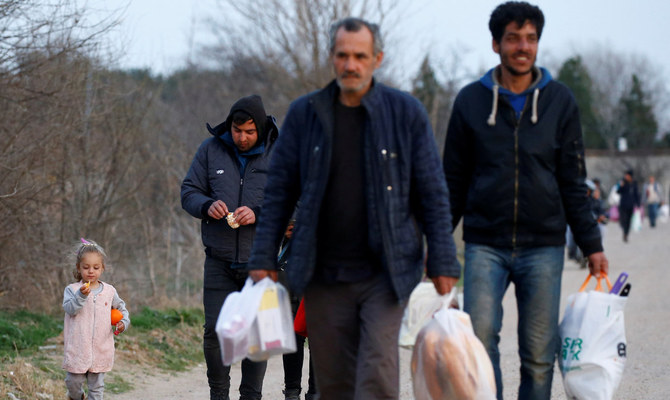
Earlier this month, developments took place in the parliaments of two European countries, with opposing results, but both incidents illustrate the same problem: that Europe continues to live in denial that it needs more immigrant workers for long-term economic prosperity.
In London, Britain’s Prime Minister Rishi Sunak surprised most by winning over rebels in his Conservative Party to push through a new law that allows the government to send some asylum seekers to Rwanda for resettlement. The bill was passed with a fairly comfortable margin of 43 votes in the House of Commons, despite a fairly united position adopted by opposition parties which voted against it.
Coincidentally, across the English Channel, France’s parliament was also voting on an equally controversial immigration bill brought by the government of President Emmanuel Macron. But Macron was unable to stem the revolt in his party and the bill was defeated, narrowly, in the Assemblee Nationale, the lower house of parliament, with 270 MPs voting against and 265 in favor.
Within minutes of having lost the vote, Macron promised to bring back the bill within days, which he did. And though he managed to get the bill passed in its second reading, with support from far-right MPs, it left Macron’s party deeply divided, with several MPs voting against it, and calling it too harsh.
While France’s legislation did not propose sending asylum seekers to a faraway land like Rwanda, it did call for a crackdown on immigration, with several repressive measures aimed at preventing migrants from coming to the country, as well as provisions for expelling those who commit crimes.
The far right in France, which has been on the ascendancy in the EU for over a decade, had dismissed the first bill as being too soft and not harsh enough to deter migrants. This position was stridently opposed by those on the left, who have maintained that these bills contravene international human rights laws.
The matter in France is headed to the courts because opposition parties have approached the Constitutional Court for its intervention.
But politics aside, there are extremely strong economic reasons for the EU to not only temper its anti-migrant policies, but actually reverse them and do so rather urgently.
For years, economists and businesspeople have been complaining of a shortage of workers in various sectors of the economy, starting with, but not limited to, areas where highly skilled people are needed. While most European governments have since woken up to these calls and are making it relatively easy for skilled foreign workers to enter the economy, the processes are far from smooth. And even now various studies point to a significant shortage of workers for the top-end of every EU nation’s economy.
While skilled people are needed for European economies to keep pace with the rest of the world, the shortage of workers is more pronounced as one moves lower down on the skills ladder.
European nations need to open up their borders for their own long-term health and wealth.
Ranvir S. Nayar
Take construction, for instance. It is a sector where skilled, semi-skilled and relatively unskilled workers are all needed. But construction firms throughout the EU have long complained of not being able to recruit locally and are often forced to turn to undocumented workers already in the country, even at the risk of penalties. Certainly, for some unscrupulous company owners, employing irregular workers is attractive because they can exploit them by not adhering to laws and regulations on minimum wages and other benefits.
According to the European Trade Union Confederation, the construction sector faces a shortage of 1.5 million new workers between now and 2030, and needs a further 1.2 million to replace those who would have retired by then.
A report by the European Commission also admits that a shortage of workers exists in all sectors and across all job profiles, from highly skilled to unskilled. It says that besides reskilling and involving more women in the workforce, the EU has to look at “targeted” migration in order to boost its workforce.
The report points to a worsening situation before the end of this decade as the total working-age population of the EU will drop from the current 265 million to 258 million, leaving a shortfall of at least 7 million workers to fill those jobs.
Also, the COVID-19 pandemic has put a spotlight on the shortfalls in the healthcare and personal-care sectors of Europe. This is turning out to be the Achilles heel of a continent that has an ageing population, and no relief in sight from foreign replacements coming in, or citizens having more children.
While Britain and France are still relatively better off than most European countries in terms of the working age of their people, they are still vulnerable to possible labor crises. Even with this being a looming possibility, the British government has already announced that it will tighten immigration laws for skilled migrants from 2024, including nearly doubling the minimum salary required for an immigrant worker to get residency visas for family members. Incidentally, these workers need to earn at least 15 percent more than the average British worker to be able to get their family members over.
The British government will also tighten, or even possibly remove, the current rule that allows foreign students to stay on for two years after their studies without fulltime jobs.
These restrictions fly in the face of moves being made by various European nations to get foreign students to study at their universities.
Such muddled policies and seemingly knee-jerk responses to what are long-term and systemic challenges for European nations, can only lead to a further deterioration in their labor market, which in turn may cause a lasting and serious impact on their economies and society.
European nations need to open up their borders for their own long-term health and wealth. It is time to get rid of short-sighted policies, and temper the politics surrounding migration.
• Ranvir S. Nayar is the managing editor of Media India Group and founder-director of EIFE.












